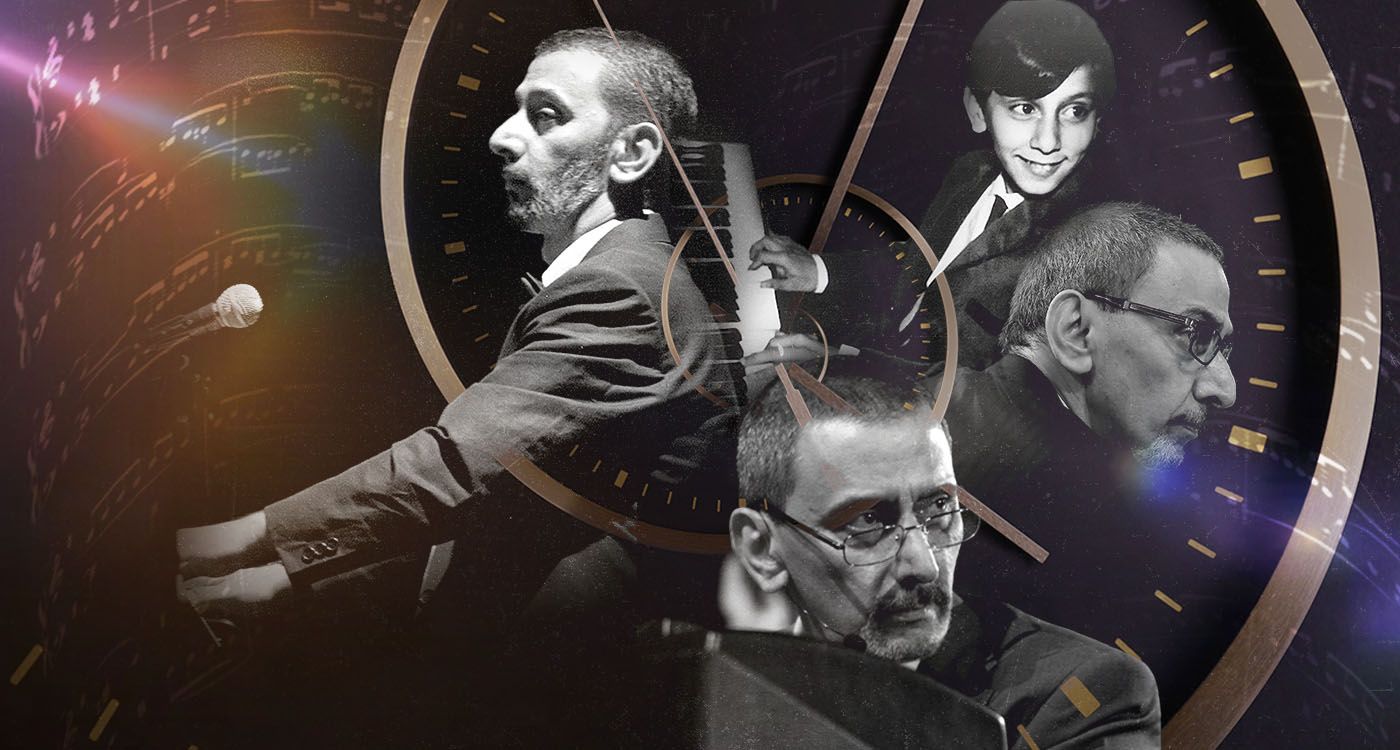
Lebanon mourns the passing of Ziad Rahbani, composer, pianist and playwright, who died on July 26, 2025, at the age of 69. Inheritor of the Rahbani legacy but unmistakably his own force, he leaves behind a universal cultural heritage: sharp, moving, satirical theater; avant-garde music blending East and West; and a voice that was bold, unfiltered and uncompromising. More than an artist, he was Lebanon’s conscience and its collective subconscious. His work will outlive generations, defying time and borders.
Born on January 1, 1956, in Lebanon, Ziad Rahbani embodied the rebellious, artistic and restless soul of his nation. Raised in a musical dynasty, he built his own identity note by note, word by word. At only 17, he composed Sa’alouni el-Nass, a politically charged and deeply emotional work that marked the beginning of a prolific, independent career. During Lebanon’s civil war, his plays like Nazl el-Surour (1974) and Bennesbeh La Bukra Chou (1978) gave voice to a disillusioned, lost generation. Blending biting satire with leftist politics and a musical style fusing jazz, funk and traditional Arabic influences, Rahbani helped reconnect a fractured and wounded nation through art.
In a matter of seconds, news of his death swept across social media. The tributes flooded in — online, from balconies, whispered from one person to the next — with a grief that felt national.
A Legacy Across Generations
Through theater, music and radio, this visionary carried part of Lebanon’s memory with him. He leaves behind not only a brilliant musical and political legacy, but also the grief of a nation still struggling to understand what it has lost. The son of Fairuz — a living legend still standing, still dignified despite a life of painful losses — Ziad was more than her heir: he was her creative partner, her challenger, her mirror. His passing is at once unthinkable and inevitable.
A Defiant Soul
Ziad Rahbani was a sharp-tongued critic with piercing humor and unmatched intellect. His words became proverbs, woven into daily conversations, quoted in cafés, repeated like folklore. In Lebanese cultural code, he is everywhere. People cite his plays mid-conversation, share a knowing look, chuckle and simply say: “Ziad.” No last name needed. He became a living legend — the leader with no title. The one who condemned sectarianism. The one who said what others wouldn’t. The one whose artistic brilliance shaped a philosophy that touched every Lebanese soul, regardless of politics or religion.
Forever Fearless
In a 2013 interview with Masculin, he declared: “Rather than provoke, my job is to expose the truth. Diplomacy is a nest of lies. I just say things the way I see them: raw.”
In a 2015 Talk of the Town interview on MTV, actress Carmen Lebbos, long linked to Ziad, said, “We met through our shared secular values, far from religious extremism. I hope he continues his musical journey, far from the ugly, twisted paths of politics.”
On LBCI in 2012, during an interview with Giselle Khoury, he observed: “We are racing toward nationalism these days.”
On DW in 2018, he described women as complex beings, with minds as intricate as “the Jeita Grotto.”
His life was punctuated by national crises and defining political moments.
On LBCI in 2018, with journalist Dima Sadek, he lamented: “We’re a people who neither read nor listen… We just talk. We should learn to listen.” Carmen Lebbos added in a phone interview for the same program: “He’s a genius composer.”
And to those who judged him, he replied in song: “Bi saraha” (“Frankly.”)
Fairuz... “Kan gher shekl el-zeitoun”
Indeed, “The olives were different.” The eternal icon, again confronting grief, having already buried so many loved ones, now faces the unbearable: the death of her son. The one who reimagined her voice, who lifted her to a new era with “Oriental jazz” songs that were bold, polarizing, but unforgettable. Music that evolved with time, accompanied entire generations, and still echoes on the lips of the people.
A Wave of Tributes
Lebanese President Joseph Aoun said Rahbani was “a living conscience, a rebellious voice against injustice and an honest mirror to the oppressed and marginalized.”
“We feared this day would come,” wrote Lebanese Culture Minister Ghassan Salameh on X. “We knew his health was deteriorating, and that his will to fight was fading.”
Former French Culture Minister Rima Abdulmalak, Franco-Lebanese herself, wrote on Instagram: “Lebanon is in mourning. Ziad Rahbani, genius of music and theater, has passed away. Son of Fairuz, a great composer, eternal rebel, he was a free and clear voice, deeply committed to justice and dignity. His songs, his plays, his sharp humor and outrage were part of our family heritage. For him, laughter was never just amusement — it was resistance. His writing cut through the absurdity of war and social inequality. ‘Want to change the system? Start by changing the chair you’re sitting on.’ May his legacy guide the next generations.”
Ziad is gone, leaving a wounded country behind, its gaze still clinging to hope — hoping for a dignified life “Bala wala chi” (“With nothing at all”). He is already deeply missed. And with him, more square miles of memory disappear — memories no balm can ever restore.
Perhaps there are no words greater than those from poet and critic Akl Awit, in Ziad’s memory:
“A minute of silence — or rather, an eternity of terror and silence…”




Comments